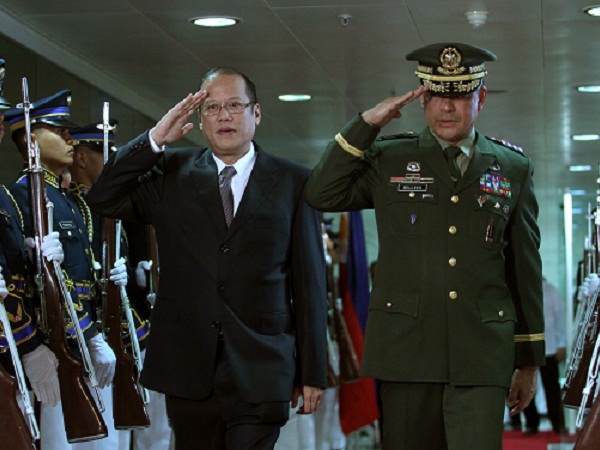
SEND-OFF RITES. President Aquino, accompanied by Armed Forces of the Philippines (AFP) Chief of Staff General Jessie Dellosa, troops the line at the Ninoy Aquino International Airport Terminal II in Pasay City on Saturday before leaving for Phnom Penh, Cambodia, to attend the Asean summit. Malacañang Photo
PHNOM PENH – Southeast Asian leaders will hold annual talks on Sunday that are set to focus on bruising territorial rows, a controversial pact on human rights and deadly ethnic unrest in Myanmar.
The Association of Southeast Asian Nations (ASEAN) summit is being held following months of acrimony within the 10-member bloc over how to handle disputes with China over competing claims to the strategically vital South China Sea.
The maritime tensions are expected to be high on the agenda at the summit in Cambodia, as well as two days of expanded talks starting on Monday that will include US President Barack Obama and Chinese Premier Wen Jiabao.
After Southeast Asian foreign ministers met in Phnom Penh on Saturday to prepare for their leaders’ events, ASEAN Secretary-General Surin Pitsuwan said the bloc was determined to lower the diplomatic temperature with China.
“Both sides, all sides, are committed to communicate… to the global community that things are under control. We have differences but we can manage,” Surin told reporters.
As a confidence-building mechanism, he said ASEAN would propose to China that a hotline be set up to allow a direct line of communication in the event of incidents in disputed waters.
Rival claims to the South China Sea have for decades made the waterways, home to some of the world’s most important shipping lanes and believed to sit atop vast natural resources, a potential military flashpoint.
China insists it has sovereign rights to nearly all of the sea, including waters close to the coasts of its Asian neighbours.
ASEAN members Vietnam, the Philippines, Malaysia and Brunei, as well as Taiwan, also have sometimes overlapping claims to the sea.
Tensions escalated this year amid complaints by the Philippines and Vietnam that China was becoming increasingly aggressive in staking its claim to the sea, including by employing bullying diplomatic tactics.
An ASEAN foreign ministers’ meeting in Phnom Penh ended in July without issuing a joint communique for the first time in the bloc’s 45-year history because of divisions over how to handle the South China Sea issue.
The Philippines and Vietnam had wanted the communique to make specific reference to their disputes with China.
But Cambodia, the host of the talks and a close China ally, blocked the moves.
While Surin insisted that tensions had eased since then, analysts said the presence of Obama and Wen at the two-day East Asia Summit in Phnom Penh starting on Monday risked inflaming the situation.
The East Asia Summit brings together the leaders of ASEAN, the United States, China, Japan, Russia, India, Australia and New Zealand.
Obama is likely to reiterate that the United States has a fundamental interest in freedom of navigation in the sea and emphasize the need for a code of conduct among rival claimants, according to analysts.
China has long insisted the United States has no right to comment on the dispute. Chinese vice foreign minister Fu Ying warned on Saturday that it did not want the South China Sea brought up at the East Asia Summit.
In one of the major set pieces on Sunday, ASEAN leaders are scheduled to endorse a pact they say will enshrine human right protections for the bloc’s 600 million people.
However the pact, drafts of which have been released to the media, has drawn widespread criticism from human rights groups which say it allows loopholes for governments.
ASEAN’s members have a wide range of political systems, from authoritarian regimes in Vietnam and Laos at one end of the spectrum to the freewheeling democracy of the Philippines at the other.
And even as the rights pact is signed, ASEAN leaders will on Sunday have to focus on violence in Myanmar’s Rakhine between Muslim and Buddhist communities that has left 180 dead since June.
Surin said ASEAN foreign ministers discussed the unrest on Saturday, with some expressing concern about the situation and whether it would impact the political transformation underway in Myanmar away from military rule.

